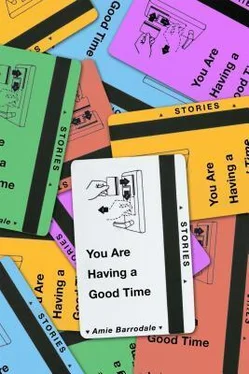Louise said, “It seems odd to put Rinpoche in Carole’s apartment and put his attendants here.”
My mom said, “Well, that’s what Jim said.”
“It’s kind of stupid to give him the little apartment in back and put his attendants in yours with all this space and the view.”
“Well, tell Jim that,” my mom said.
I said, “Call him and tell him. He won’t listen to us. Call him and tell him. When we say it, he won’t listen. If you say it, he’ll listen. Call him and tell him.”
I repeated myself a few times.
Louise said, “I will.”
“Because Rinpoche should be in here,” I said. I pointed at the floor, meaning that he should be in my room.
“I think your mom’s might make more sense,” Louise said. “He hates the sound of motorcycles. He likes quiet.”
“No,” I said, “this is clearly the better room.”
* * *
Louise’s call changed it, and we began to really clean. I took all the bags and baskets and boxes and unopened mail and trash bags of pills and the dharma books, and the hundreds of audiocassette recordings of dharma lectures, and put them in a pile. It took about an hour. The pile covered the entire living-room floor. You could walk around it to get to the patio, or to the couch, but it was about twelve feet in diameter. It was evening, and looking at the pile, and all the mess that remained around it, I recognized the amount of work there was to be done. I was sure it could be done, but looking at the pile, I thought, It cannot be done.
The next day, my mother bought twenty-five moving boxes. I took every single thing out of the refrigerator and out of the cabinets — every cooking utensil, every exotic spice — and we went through them. The things she wanted to keep went into boxes, which we would take to storage later. The things she would throw away went into garbage bags. The nicer things that she did not want we put outside, and people took them away — for example, the meat slicer. She had too many expensive culinary supplies. We went on in this way, in each room, first clearing the clutter and then beginning to clean the surfaces. When the clutter had all been thrown away or boxed up and carried down, my mother hired a carpet cleaner, and he came and shampooed the carpets. He mentioned, on leaving, that I had quite a lot of hair. I began to clean the surfaces in each room, and my mother began to go and find — with economy — the small things that were needed to fill a space. She made several trips to her office, where she “borrowed” five armchairs, two standing lights, two patio chairs, a patio table, a desk, a coffee table, and several side tables.
Then she came home crying. Jim had called her on the phone while she was out.
“What did he say?”
“He said he doesn’t know if Rinpoche can stay with us.”
“What?”
“He said he wasn’t sure about it.”
“What did you say?”
“I said you can’t turn around and change your mind. We’ve been working too hard. You can’t just up and change it.”
“What’d he say?”
“He said he had to think about it.”
“Why?”
“He said, ‘The clutter! The clutter!’” She imitated Jim’s voice saying, “‘The clutter.’”
“What clutter?” I said. “We’re cleaning. Did you tell him we would clean it?”
“I told him that, and he said, ‘ How?! ’”
“What’s he mean, how? You take it and you throw it out, that’s how. Maybe he doesn’t know — he is so busy buying fish at Costco.”
My mother smiled.
“Remember that disgusting fish he served us? It looked like it had exploded.”
“He said he was going to return it.”
“Return a fish!”
“They do that, too, at Costco — they’ll take anything back.”
“But he couldn’t have — he’d be ashamed to bring in some exploded salmon and a receipt.”
“I’m sure he did it — brought that nasty thing in and got his twenty-five dollars. He kept saying, ‘How are you going to clean in time?’ and ‘The clutter!’”
“I don’t like that, the way he says your name.”
“He’s abusive. I’ve had the thought about him before, of just — he’s abusive. To go and change his mind like that. Yes, Rinpoche can stay with you; no, he’s staying across the hall — I’m in control and I’m the boss and you will do what I say and it will be the way I say it is.”
“Abusive.”
“It’s not physically abusive, but it’s abuse. Getting our hopes up. Look at all the work we did, and then — not even a ‘no’ but just an ‘I’m not sure’—make sure we’re still on the line, working, sucking up — it’s classic male abuse.”
* * *
Five days went by. I had torn up the shelf paper in the kitchen cabinets, taken each shelf down, washed and dried it, and then cut new shelf paper to fit. I had thrown out everything in the refrigerator and in the freezer, cleaned every shelf and surface by removing the shelves and soaking them in hot, soapy water, and then replaced them. I had moved the refrigerator and the stove to clean and wash behind them, and scrubbed the kitchen floor on my hands and knees. I had found a draining pan under the refrigerator full of mold, emptied it, cleaned it, bleached it, and replaced it. I had removed everything from the bathroom closet and all of the drawers, and wiped the surfaces down, and scrubbed all the water fixtures and tiles with a brush and grout cleaner. I cleaned the fireplace and took the grate out to the grass to scrape it down with a razor. I washed the windows, and buffed the heating ducts with steel wool. My mother bought spray paint and repainted them white, and we opened all the doors to air the fumes. Several of the other Buddhists in Seattle came over to help us, but they were disoriented — like people stepping into a new job — and I was exhausted, and had taken control of the space, and had difficulty delegating. The place was completely clean, and they couldn’t find anything to do. They came to me asking for suggestions. Then, when I made suggestions, they were offended — they did not want to take steel wool to the feet of the iron railing on the patio of my home. This was understandable. But now Carole’s place, by comparison, which had seemed so clean and so un-in-need of work, presented itself by comparison, and I was too exhausted to begin, and two women from the sangha took over and did as I had done — carrying down what had seemed like no belongings, wiping surfaces that had appeared clean — and it took them two days, and by the end, they owned the territory of Carole’s place as I owned the territory of my mom’s apartment. It was a Friday afternoon, and I was alone. The women who had cleaned Carole’s had gone for coffee, to celebrate their work, and my mother was gone, too. Jim was coming over to hang art on my mother’s walls — a loan — and to rehang the doors of the closet in my room.
Jim noticed that the baseboards of one wall were not painted in the living room, and they were not painted in my mother’s room. I had not even seen them. I did not even know it was something I had omitted. My mother had seen the flaw and asked me to paint several days before. I had agreed, but then I had ignored it, and I had not delegated it when I had the chance, so now Jim pointed it out.
He had paint in his truck, and a long device for doing baseboards. After he had hung the art, he went down to his trunk and brought up paint. Quickly, efficiently, he painted the baseboards in the living room. He had an attitude. I thought he had an attitude. To me it felt like he was thinking, I notice the details.
We had brought the closet doors up from storage for him to rehang. They were leaning against the wall in the front room. I think maybe it was just the way Jim moved through my mother’s apartment— my space —like he owned it. I suddenly became enraged. Before he could paint the baseboards in my mother’s bedroom, and before he could hang the closet doors, I told him, “Leave.”
Читать дальше












